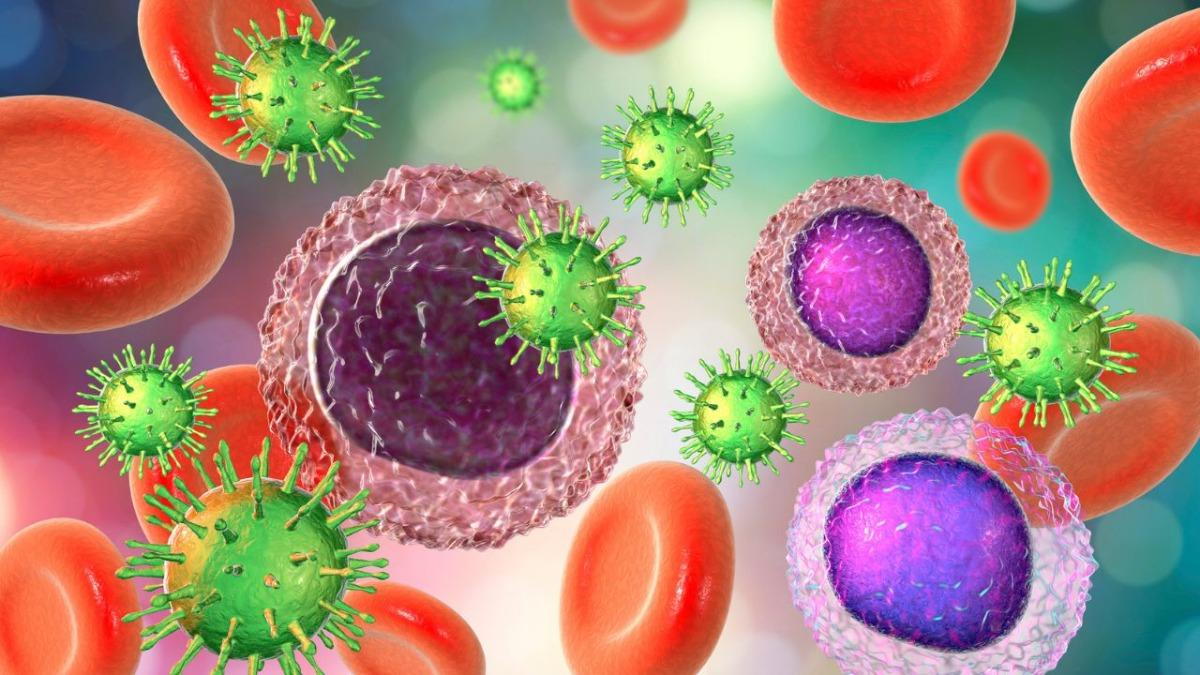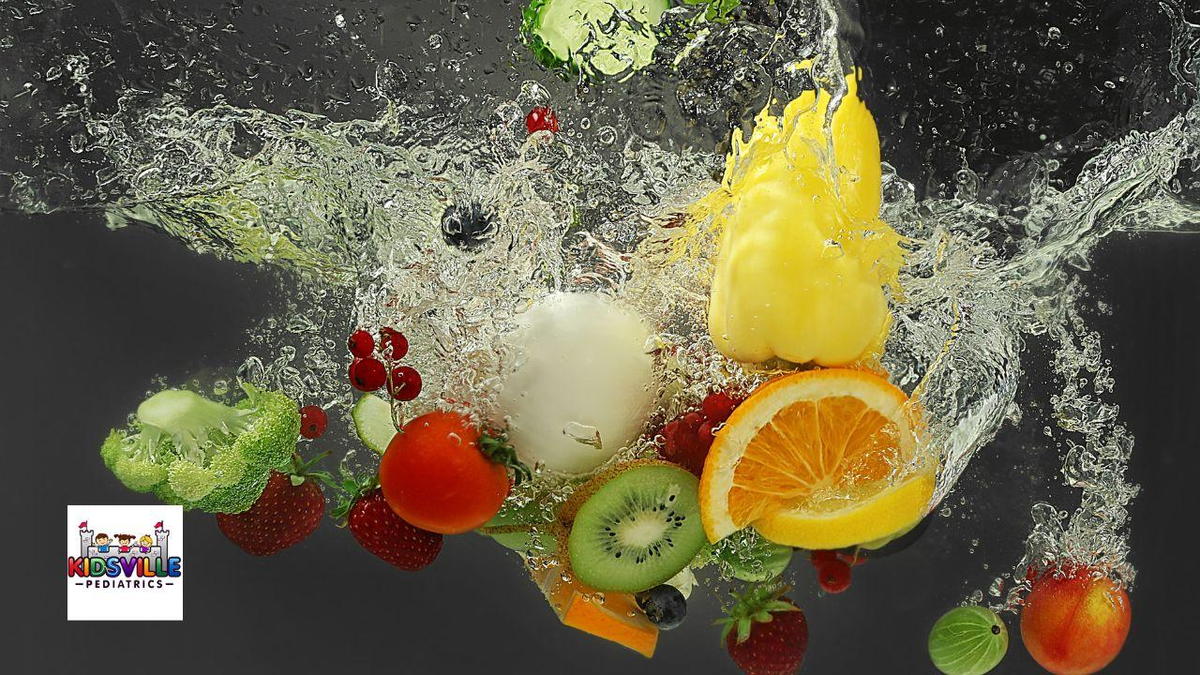
At Kidsville Pediatrics Mansfield, we understand that keeping your child healthy is your top priority. Ensuring your little one's immune system is strong and resilient can make all the difference in their ability to fend off common illnesses and infections. That's why we've created this guide so parents can learn the essential steps in boosting your child's immunity.
Navigating the world of immune health can be overwhelming, but you don't have to do it alone. From dietary choices to lifestyle adjustments, remember that every decision you make plays a crucial role in your child's well-being.
Think of your child's immune system as their very own superhero team, ready to fight off the villains of germs and viruses. Just like any superhero, they need the right training, equipment, and support to stay strong and ready for action. By following our pediatric recommendations, you can create an environment that fosters robust immune health, helping your child thrive in every aspect of their life. Whether it's through daily routines or small changes in habits, you'll discover practical ways to make a big impact on your child's overall health.
I. Balanced Nutrition: Essential Vitamins and Minerals for Immunity
Why Water is Essential
Let’s begin with the most obvious but oft-forgotten element to health – water. Ensuring your little one's immune system is strong and resilient can make all the difference in their ability to fend off common illnesses and infections.
The human body can last weeks without food, but only days without water. Since our bodies are made up of 50 to 75% water, it’s crucial to maintain proper hydration. Because the body can't store water, we need fresh supplies every day to make up for losses from the lungs, skin, urine, and feces. The amount of water needed depends on body size, metabolism, weather, diet, and activity levels.
Here are some interesting facts about our internal water supply:
Body water content is higher in men than in women and decreases with age.
Most mature adults lose about 2.5 to 3 liters of water per day, with increased loss in hot weather or during prolonged exercise.
Elderly people lose about 2 liters per day.
Water loss needs to be replaced daily.
Water is needed for most body functions, including:
Maintaining the health and integrity of every cell.
Keeping the viscosity of blood so it can flow through blood vessels.
Eliminating by-products of metabolism, excess electrolytes, and waste products.
Regulating body temperature through sweating.
Moistening mucous membranes in the lungs and mouth.
Lubricating and cushioning joints.
Reducing the risk of urinary tract infections (UTIs) by keeping the bladder clear of bacteria.
Aiding digestion and preventing constipation.
Moisturizing the skin to maintain its texture and appearance.
Carrying nutrients and oxygen to cells.
Serving as a shock absorber inside the eyes, spinal cord, and amniotic sac during pregnancy.
Water in Our Food
Most foods contain water, even those that appear hard and dry. About 20% of our total water intake can come from solid foods alone. Additionally, the process of digesting food produces a small amount of water. However, the majority of our water needs to come from fluids.
Recommended Dietary Fluid Intake
Here are some general guidelines:
Infants 0–6 months: 0.7 liters (from breastmilk or formula)
Infants 7–12 months: 0.8 liters (from breastmilk, formula, food, plain water, and other beverages)
Children 1–3 years: 1 liter (about 4 cups)
Children 4–8 years: 1.2 liters (about 5 cups)
Boys 9–18 years: 1.6 to 1.9 liters (about 6 to 8 cups)
Girls 9–18 years: 1.4 to 1.6 liters (about 5 to 6 cups)
Tips for Drinking More Water
If the idea of drinking lots of water each day doesn’t appeal to your child, try these tips:
Add a squeeze of lemon or lime, or some strawberries or mint leaves to plain water.
Keep a bottle or glass of water handy at all times.
Drink water with each meal and snack.
Add fresh-fruit-infused ice cubes to a glass of water.
Keep in mind, making sure that your child drinks enough water is a vital part of building a strong immune system.
Probiotics: The Benefits of Gut Health for Immune Function
Your child's body is home to billions of organisms, including bacteria, fungi, and yeasts, forming what’s called the human microbiome. Most of these organisms are harmless, and many help your child’s body function properly. Probiotics are beneficial bacteria that are part of this microbiome.
Probiotics are “good bacteria” that can be taken as supplements or found naturally in certain fermented and aged foods like yogurt, cheese, and sourdough bread. Some common probiotic strains for kids include:
Lactobacillus rhamnosus
Lactobacillus acidophilus
Saccharomyces boulardii
Bifidobacterium lactis
Benefits of Probiotics for Kids
While more research is needed, some studies suggest that probiotics may offer the following benefits for children:
Improved digestion
Help gastrointestinal illnesses
Reduction of side effects from antibiotics
Improved immune system function
Reduced risk of autoimmune diseases
Prevention of asthma and allergies
Probiotics might also benefit mental health and prevent recurring urinary tract infections, but further research is necessary.
Are Probiotics Safe for Kids?
Probiotics are generally considered safe for kids, with some exceptions.
Do not give probiotics to kids whose immune systems are compromised, weak, or have cancer.
If your child is taking antibiotics, consult with your Mansfield pediatrician or pharmacist first, as not all probiotics are effective when mixed with antibiotics. Potential side effects of probiotics include gas, bloating, and constipation, which usually resolve after a few days. Always check with your child's pediatrician if you notice any changes in their bowel habits.
Choosing the Best Probiotic for Your Child
Supplements are not regulated, and dosages for each strain can vary. Probiotic-rich foods include:
Yogurt
Sauerkraut
Kombucha
Kimchi
Kefir
Miso
Fermented cheeses like cheddar or Gouda
Pickles (fermented, not in vinegar)
Sourdough bread
For most kids, foods like yogurt contain all the probiotics needed to support a healthy gut. If you’re curious about supplements or have specific concerns, talk to your pediatrician in Mansfield, TX. They can recommend probiotics or other ways to keep your child’s tummy healthy and happy.
Fruits and Veggies for Immunity
Berries
Berries are packed with essential vitamins, minerals, and antioxidants that nurture your child’s immune system. They’re a delicious way to help keep your little one healthy.
Berries are high in vitamins, especially vitamin C, which plays a crucial role in immune system performance. The antioxidants in berries combat free radicals in the body, aiding immune cells to operate better, decrease inflammation, and support overall immune health.
There’s a wide variety of berries you can add to your child’s diet, each offering unique perks.
Blueberries
Full of vitamins and minerals like vitamin C, vitamin K, and manganese, blueberries also boast potent antioxidants like anthocyanins, which contribute to their bold hue and health benefits.
Strawberries
Strawberries, loved for their sweetness, are rich in vitamin C, manganese, folate, and potassium. They also contain antioxidants and polyphenols, which can strengthen the immune system.
Raspberries
Raspberries, with their sweet and tangy taste, offer vital nutrients like vitamins C and K, and manganese. They also have antioxidants and phytonutrients that support immune health.
Leafy Greens
Leafy greens offer a wealth of nutrients that support your child's immune health in various ways.
Leafy greens are packed with essential vitamins like A, C, and K, and minerals such as iron, calcium, and magnesium. These nutrients strengthen the immune system, while antioxidants and phytonutrients protect immune cells from damage and ensure they function properly.
Including a variety of leafy greens in your child's diet ensures they receive a broad spectrum of nutrients for optimal immune health.
Spinach Spinach is a mild-tasting and versatile leafy green rich in vitamins A, C, and K, along with key minerals like iron, calcium, and magnesium.
Kale A renowned superfood, kale is filled with vitamins A, C, and K, as well as antioxidants and fiber.
Collard Greens Collard greens offer many nutrients similar to spinach and kale, including vitamins A, C, and K, folate, calcium, and manganese.
Broccoli Broccoli offers vitamins, minerals, and antioxidants that support your kid’s immune system. It is particularly high in vitamin C, vitamin K, and folic acid, all vital for immune function.
Beta-Carotene Sources
Sweet potatoes are a tasty choice and a great source of beta-carotene, which plays a big part in immune health.
Beta-carotene is a key nutrient for a strong immune system, primarily because it converts into vitamin A in the body.
Conversion to Vitamin A Beta-carotene acts as a precursor to vitamin A, which is crucial in maintaining the health of the skin and mucous membranes—our first line of defense against pathogens.
Alongside its conversion into vitamin A, beta-carotene works as an antioxidant, protecting immune cells from damage and supporting overall immune function.
Other Beta-Carotene-Rich Foods Besides sweet potatoes, other foods like carrots and squash also offer plenty of beta-carotene.
Carrots Carrots are another excellent source of beta-carotene, supporting your child's immune system with other vital nutrients like vitamin K and potassium.
Squash Squash, including both summer and winter varieties, provides heaps of beta-carotene, vitamin C, fiber, and potassium, nourishing your child's immune system.
Nuts and Seeds: Nutrient Powerhouses
Nuts and seeds provide healthy fats and a broad array of nutrients, key to supporting a healthy immune system.
Healthy fats in nuts and seeds, such as omega-3 and omega-6 fatty acids, are crucial for immune cell health and function. Nuts and seeds also provide vital vitamins and minerals like E and B6, zinc, copper, and selenium, which work together to create a strong immune system.
Almonds Almonds are loaded with healthy fats, vitamin E, and manganese, which play a big part in improving immune function and providing antioxidant support.
Walnuts Walnuts contain omega-3 fatty acids and other nutrients like vitamin E and selenium, supporting immune cell function, reducing inflammation, and shielding against oxidative stress.
Chia Seeds Chia seeds are rich in omega-3 fatty acids, fiber, protein, and antioxidants, promoting immune health by helping cells work as they should and reducing inflammation.
Pumpkin Seeds Pumpkin seeds provide plenty of zinc, healthy fats, and antioxidants.
Lean Protein for Immune Health
Lean proteins are key to the growth and upkeep of a strong immune system.
Amino acids, the building blocks of proteins, are fundamental for the correct operation of the immune system. They are required to create antibodies and immune cells, which support the body’s defense against pathogens.
Chicken Chicken is flexible and easy to digest, offering essential amino acids for immune health.
Turkey Turkey is rich in essential amino acids and nutrients like vitamin B6 and niacin, all vital for immune function.
Fish Fish, such as salmon, mackerel, and tuna, are fantastic sources of omega-3 fatty acids and high-quality protein, supporting immune health with key vitamins and minerals like vitamin D and selenium.
Plant-Based Proteins Plant-based proteins like beans, lentils, chickpeas, and tofu provide protein, fiber, and essential nutrients for immune health, along with key plant elements like antioxidants and phytonutrients.
Additional Immunity Boosters
Besides the immune-boosting foods listed above, a few other foods have been found to support immune health.
Garlic Garlic is rich in potent compounds with antimicrobial and immune-boosting properties. Adding garlic to your child's diet may aid in supporting their overall immune health.
Ginger Ginger is known for its anti-inflammatory and antioxidant properties, which can help support immune function and guard against illnesses.
Turmeric Turmeric has curcumin, a powerful anti-inflammation agent and antioxidant. Including turmeric in your child's meals can potentially support their immune health.
Say No to These Foods for Your Kids
Ensuring your child eats the right foods is crucial for their health and development. At Kidsville Pediatrics Mansfield, we recommend avoiding or limiting certain foods and drinks to keep your little ones safe and healthy.
Honey
Did you know that honey can cause a serious type of food poisoning called botulism in children under 12 months old? Avoid giving your baby honey in any form, whether it’s added to food, water, infant formula, or on a pacifier.
Added Sugars and Sweeteners
Foods with added sugars, low-calorie sweeteners, or no-calorie sweeteners are not recommended for children younger than 24 months old. Common items like muffins, flavored yogurts, and cookies often contain added sugars. Be sure to check the Nutrition Facts Label to find foods with no added sugars. Sugar-sweetened drinks, such as soda, flavored milks, and sports drinks, also contain added sugars and should be avoided.
Cow’s Milk
Before 12 months old, cow’s milk should not be given to your baby. It can increase the risk of intestinal bleeding and has too many proteins and minerals for your baby’s kidneys to handle. Additionally, cow’s milk does not provide the necessary nutrients that your baby needs.
Juice
Juice is not recommended for children under 12 months old. After they turn one, it’s best to limit juice intake to 4 ounces or less of 100% juice per day. Juice drinks, fruit drinks, and fruit-flavored drinks often contain added sugars and should be avoided. Whole fruits are a healthier option for your child.
Caffeinated Drinks
Caffeinated drinks, such as soft drinks, tea, coffee, and sports drinks, should be avoided for children younger than 2 years old. There is no established safe limit for caffeine for young children, so it’s best to keep these drinks out of their diet.
II. Regular Exercise: How Physical Activity Boosts the Immune System

Exercise is essential for your child's overall well-being. It not only helps decrease the chances of developing heart disease but also keeps their bones healthy and strong.
While we do not know exactly how exercise affects immunity, several theories suggest it might help:
1. Flushing Out Bacteria Physical activity may help flush bacteria out of the lungs and airways, reducing the chance of getting a cold, flu, or other illnesses.
2. Boosting White Blood Cells Exercise may cause changes in antibodies and white blood cells (WBCs), the body's immune system cells that fight disease. These WBCs might circulate more rapidly during exercise, potentially detecting illnesses earlier than usual. However, it's unclear if this actually prevents infections.
3. Increasing Body Temperature The brief rise in body temperature during and right after exercise may prevent bacteria from growing, similar to the body's response to a fever. This temperature rise could help the body fight infections more effectively.
4. Reducing Stress Hormones Exercise slows down the release of stress hormones, which can increase the chance of illness. By lowering stress hormones, exercise might protect against sickness.
Exercise in Moderation
While exercise is beneficial, it’s important not to overdo it. People who already exercise should not increase their workout intensity solely to boost immunity.
III. Sleep Hygiene: The Importance of Quality Sleep for Kids

Your child's immune system is crucial for healing wounds, keeping infections at bay, and protecting against diseases. Research shows a strong connection between sleep and immune health. Consistent, high-quality sleep strengthens the immune system, allowing for balanced and effective immune function. Conversely, lack of sleep can disrupt the immune system, making your child more susceptible to illnesses.
How Sleep Enhances Immunity
1. Sleep is crucial for both innate and adaptive immunity. During sleep, the body increases the production of cytokines associated with inflammation, which helps with recovery and fortifies immunity. This activity is driven by sleep and the circadian rhythm, the body’s 24-hour internal clock.
2. Just as sleep helps consolidate learning and memory, it also strengthens immune memory. During sleep, the immune system's components interact to reinforce the ability to recognize and react to harmful antigens. This process is believed to occur because sleep frees up energy for critical immune tasks.
The Impact of Sleep on Vaccines
Research shows that sleep enhances the effectiveness of vaccines. Studies on vaccines for hepatitis and H1N1 have found that lack of sleep after vaccination weakens the immune response, reducing vaccine protection and potentially necessitating a second dose. Ensuring your child gets sufficient sleep after vaccination helps their body develop strong immunological memory.
Sleep and Allergies
Emerging research indicates that sleep and allergies are interconnected. The body's circadian rhythm regulates reactions to allergens, and disruption of this rhythm may increase allergic reactions. Additionally, sleep deprivation can lower the threshold for allergic reactions, making children more susceptible to allergies.
At Kidsville Pediatrics Mansfield, TX, we are dedicated to helping your child develop healthy sleep habits for optimal immune health.
IV. Stress Management: Teaching Kids Relaxation Techniques

Young children often experience stress from family issues such as discord, divorce, or loss. Even positive changes, like moving to a new home or welcoming a new sibling, can be stressful. School can also be a source of anxiety, whether it's making friends, dealing with bullies, or worrying about tests and grades. Let’s accept it – as children grow, their stressors expand. Teens may face stress from social pressures, academic demands, and concerns about fitting in. The rise in mental health issues during the pandemic has also impacted teens, with increases in self-harm, drug-related incidents, and eating disorders.
Stress in young people can manifest in various ways. Irritability and anger are common, as stressed kids may become more short-tempered. Sudden changes in behavior, trouble sleeping, and neglecting responsibilities are also signs of high stress levels. Eating changes, either overeating or loss of appetite, can be stress responses. Frequent illness, such as headaches or stomach aches, may also indicate stress.
Managing stress effectively involves several strategies. Prioritizing sleep is essential. Ensure your child gets adequate sleep:
9-12 hours for ages 6-12
8-10 hours for teens
Limiting screen use at night can protect sleep quality. Encourage physical activity, as it is a powerful stress reliever. Aim for at least an hour of daily physical activity. Talking about stress with a trusted adult can help your child find perspective and solutions. Balancing activities and downtime is important; ensure a healthy mix of favorite activities and free time. Spending time outdoors in nature can also reduce depression and anxiety. Encourage your child to write about positive feelings, as journaling can ease anxiety and depression. Practicing mindfulness techniques like deep breathing and meditation can significantly reduce stress in teens.
You, as a parent, play an important role in your child’s stress management. Model healthy coping strategies by discussing how you handle stress. Encourage problem-solving by letting your child solve minor issues on their own. Promote media literacy by teaching your child to navigate online content wisely and limit screen time. Combat negative thinking by helping your child reframe negative thoughts and focus on positive outcomes.
V. Vaccinations: Keeping Up with Immunization Schedules

Vaccines play a crucial role in boosting your child’s immune system by teaching it how to fight off germs. It usually takes a few weeks for protection to develop after vaccination, but once it does, it can last a lifetime. Some vaccines, like those for tetanus or the seasonal flu, require booster doses to maintain your body’s defenses.
A baby’s immune system isn’t fully developed at birth, making them more susceptible to infections. Vaccines help build your baby’s natural defenses by teaching their immune system to recognize and fight germs. This protection is essential for keeping your baby healthy and safe from serious illnesses.
Vaccine Ingredients
Modern vaccines use only the ingredients that are safe and effective. These may include:
Adjuvants: Such as aluminum salts, which enhance the body’s response to the vaccine (also found in antacids and antiperspirants).
Stabilizers: Like sugars or gelatin, which help maintain a vaccine's effectiveness after manufacturing (naturally present in the body and in foods like Jell-O®).
Formaldehyde: Used to prevent bacterial contamination during manufacturing (naturally present in the body at higher levels than in vaccines, and found in the environment and household products).
Thimerosal: A preservative found in multi-dose vials flu vaccines. Single-dose vials are available as an alternative.
Vaccines Are Safe
Before a new vaccine is given to people, it undergoes extensive lab testing. Clinical studies can take years before a vaccine is licensed. Even after licensing, the FDA, CDC, NIH, and other agencies continue to monitor and investigate any potential safety concerns. Ensuring the safety of all vaccines is a top priority for the CDC.
Mild Side Effects Are Expected
Vaccines, like any medicine, can cause side effects, but they are usually mild. Common side effects include fever, tiredness, body aches, and redness or swelling at the injection site. These mild reactions typically resolve on their own within a few days. Serious, long-lasting side effects are extremely rare, and the CDC monitors and investigates any reports of serious side effects.
Why Your Child Should Get Vaccinated
Vaccines can prevent diseases that used to cause serious harm or death to infants, children, and adults. A child is at risk without vaccinations so it is always better to prevent diseases than to treat it after it has transpired. Vaccination is a safe, highly effective, and easy way to keep your kid’s and your immune system healthy. The recommended vaccination schedule is designed to maximize effectiveness and safety. For any questions or concerns about vaccines, talk with your child’s pediatrician at Kidsville Pediatrics Mansfield.
You may also schedule an appointment online: https://www.kidsvillepeds.com/appointment/
Or visit/call our clinics:
Kidsville Pediatrics Mansfield TX: 682-341-3910; 1759 Broad Park Circle S, Suite 201 & 205, Mansfield, TX
Kidsville Pediatrics Southlake: 682-345-8010; 2813 W. Southlake Blvd Suite 100 Southlake, TX
Kidsville Pediatrics McKinney: 469-885-9400; 5881 Virginia Pkwy. Suite 300 Mckinney, TX

